While diversity declines sharply at the top, and unconscious bias remains a serious challenge, PR employers seen as making progress in creating inclusive environments
TORONTO, MAY 31, 2021 — The Canadian public relations profession is diverse, but both racial and gender diversity decline sharply at the top — the executive level — according to a comprehensive Leger survey of Canadian communications professionals.
In other key findings, almost half of racialized professionals and one-third of female respondents believe that during their careers they have been turned down for a job or promotion due to bias or discrimination. However, large majorities of respondents of all backgrounds credit their current employers with creating “inclusive, positive environments.”
And while there is no ethnicity gap in the health of Canadian PR professionals, there is a significant gender gap, with women of all races experiencing far greater physical, mental and emotional health challenges than men.
The survey, conducted by Leger for the Canadian Council of Public Relations Firms (CCPRF), the Canadian Public Relations Society (CPRS) and the International Association of Business Communicators (IABC), surveyed a sample of 1,231 Canadian communications professionals in January and February 2021, of whom 24% identified as BIPoC professionals. 52% of respondents work in corporate, government or non-profit environments, while 48% work in public relations agencies.
1. Diversity at junior, intermediate and senior levels – but it usually stops near the top
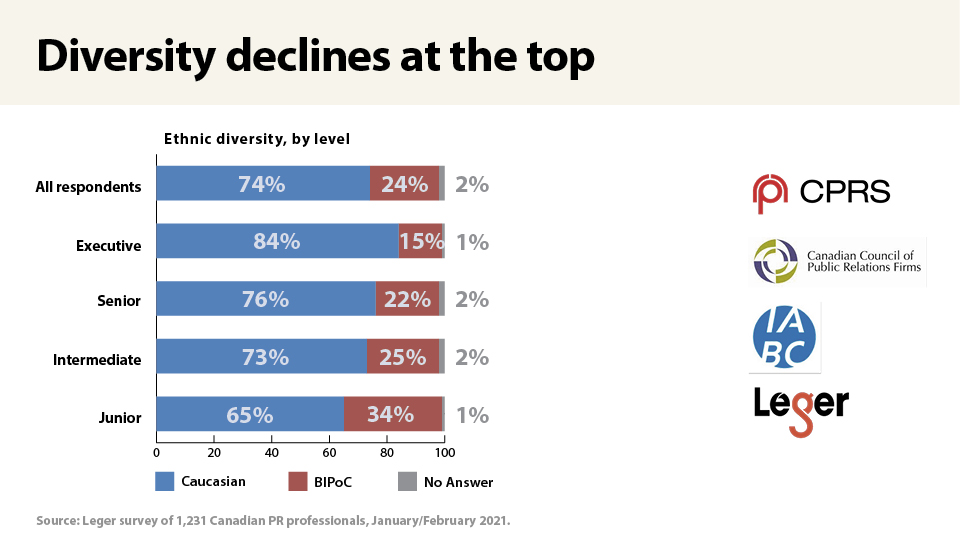
Racialized people over-index at junior levels, and have parity at intermediate and senior levels, but Caucasian professionals dominate executive levels, holding 84 percent of executive roles among respondents.
Gender diversity at senior levels is high, as two-thirds of respondents in executive roles were women; however, men over-index at executive levels relative to their total numbers in the profession — with 30 per cent of all male respondents holding executive roles compared with 18 per cent of female respondents.
The survey shows large numbers of early-career female and BIPoC professionals, with 43% of females and 49% of BIPoC respondents in the first decade of their careers, compared with 37% of males and 39% of Caucasians.
Almost half of BIPoC respondents (48%) believe they have been previously turned down for a job or promotion because of bias or discrimination, compared with only 23% of Caucasian respondents. Women are significantly more likely than men to report such inequity – 32%, compared with 22% of men. A majority (52%) of BIPoC professionals also believe “it is hard for someone like me” to advance (52%) and to find employment (50%).
When asked about equity of pay and opportunity in their current employment, there is no statistical difference between BIPoC and Caucasian respondents’ perceptions of “not being promoted or received raises at the same level as my colleagues.” There is, however, a gender gap, as 35% of women hold this concern, compared with 23% of men.
2. Current employers credited with creating inclusive, positive environments
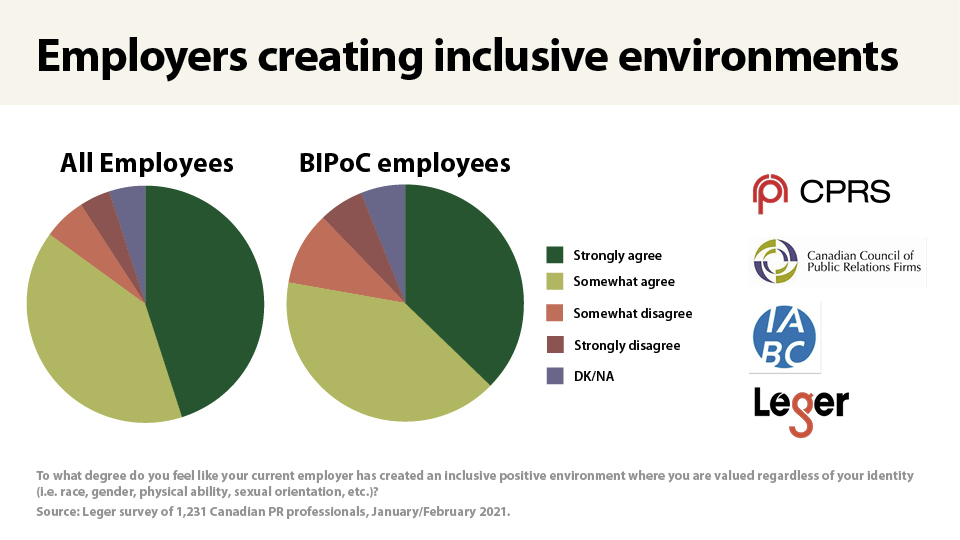
Notwithstanding previous career experiences, 85% of respondents, including 77% of BIPoC professionals, agree their current employer “has created an inclusive, positive environment where one is valued regardless of identity, including race, gender, physical ability or sexual orientation.”
Among respondents working at PR agencies, the numbers are even higher – rising to 93% of respondents, including 91% of BIPoC professionals.
3. BIPoC professionals feel trusted, valued, respected and accepted – but with pressure to conform
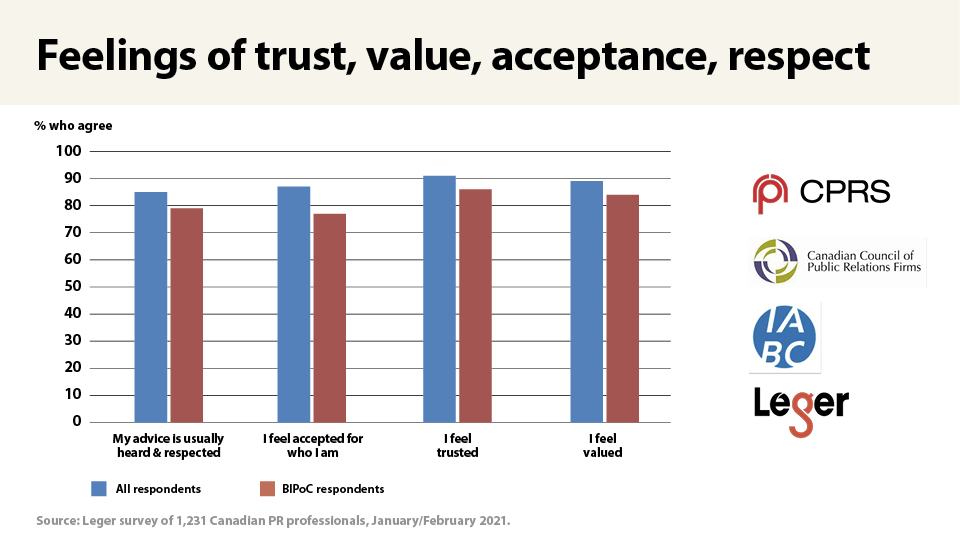
BIPoC professionals feel trusted (86%), valued (84%), respected (79%) and accepted for who they are (77%) – even more so among those who work in agencies (trusted: 90%; valued: 89%; respected: 84%; accepted: 92%). However, 45% of BIPoC respondents perceive they must “conform and be someone I’m not to fit in” (31% in agencies), significantly more than Caucasians (21% overall, 17% in agencies).
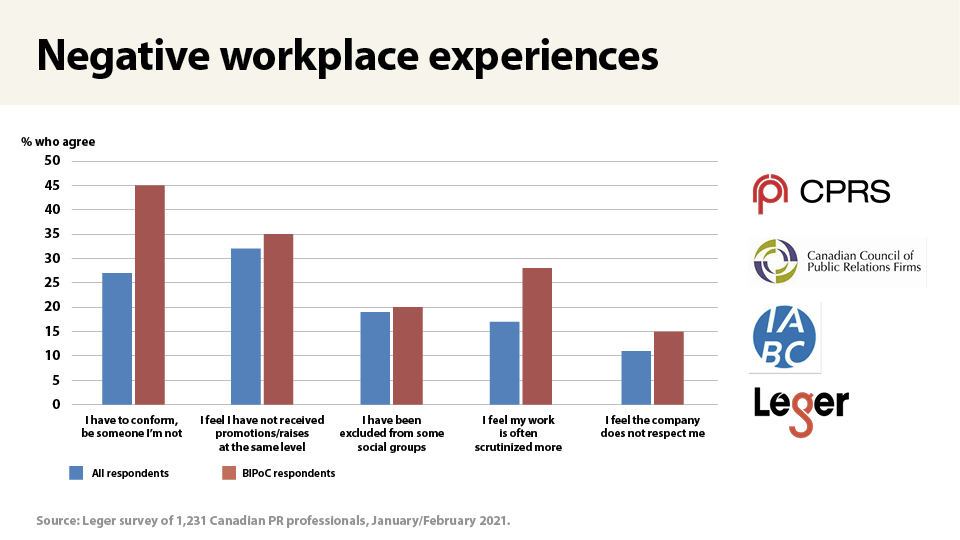
4. High pride, lower satisfaction among BIPoC professionals
BIPoC professionals are proud of the industry (85%) and recommend it to other BIPoC (76%) peers, but are far less satisfied with their current positions (64%) and have lower perceptions of being treated equally (52%). BIPoC professionals at agencies are more likely to be satisfied with their current position (71%).
5. Unconscious bias, microaggressions reported by many BIPoC professionals
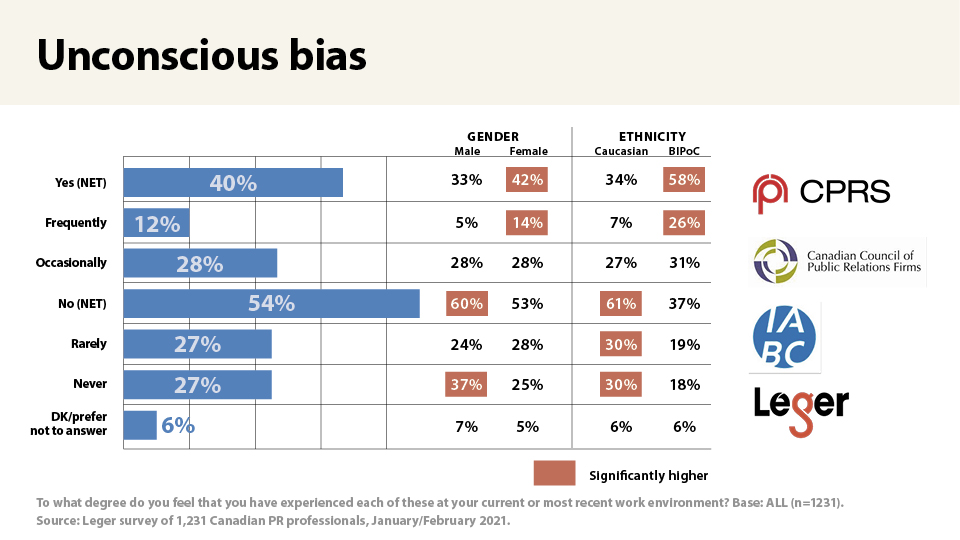
Majorities of BIPoC respondents believe they have experienced unconscious bias (58%) and micro-aggressions (54%), and 35% believe they have experienced discrimination. These numbers are significantly lower among BIPoC professionals at PR agencies (unconscious bias: 37%; micro-aggressions: 36%; discrimination: 13%).
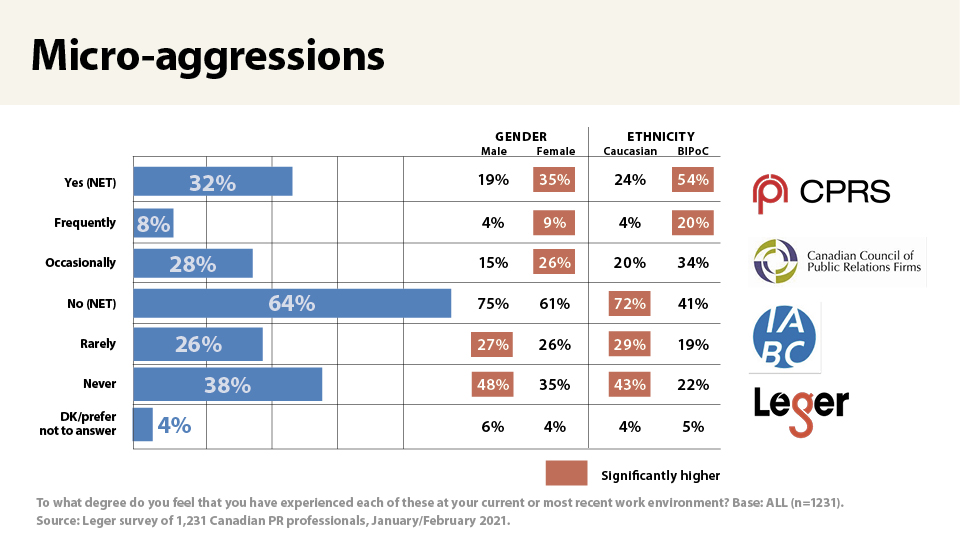
6. A gender gap on mental, physical and emotional health
There is no ethnicity gap in mental, physical or emotional health – but the survey found a significant gender gap on all three criteria. 55% of women have experienced detrimental mental health effects in the workplace, compared with 44% of men. The gender gaps are also large in physical health effects (45% of women, 31% of men), and emotional health effects (43% of women, 32% of men).
A commitment from association leaders
In analyzing the results, the boards and leaders of CCPRF, CPRS and IABC recognize that having baseline data is only the beginning.
All three associations pledge to continue their work, both internally and in collaboration with one another, to increase the diversity in the profession at all levels, to remove barriers to the advancement of BIPoC professionals, to improve the inclusion experience of employees and members, to provide ongoing training and education to professionals, and to advocate for greater diversity, equity and inclusion in our employers and organizations.
Limitations of the survey
Since the survey was conducted via open links, no margin of error can be assigned to the sample. For comparative purposes, however, a probability sample of 1,231 respondents would have a margin of error of +/- 2.8%, 19 times out of 20.
While the survey enables statistically meaningful analysis of the experiences of racialized professionals, and of women and men, it does not allow a segmented analysis of the distinct experiences of Black, Indigenous or LGBTQ+ professionals. Recognizing that these experiences are not homogenous, and that people of specific backgrounds face greater barriers, the survey committee recommends follow-up research to better understand each community and its experiences.
In addition, since the study presents a snapshot of the profession’s diversity at one point in time, it does not yet allow conclusions about its ability to retain BIPoC professionals. For this reason, the committee recommends using these data as benchmarks for future research that explores retention and promotion of today’s early- and mid-career cohort in the years to come.
For more information:
For the Canadian Public Relations Society (CPRS):
Cam McAlpine, Vice President
cam@earnscliffe.ca
For the International Association of Business Communicators (IABC):
Diane Bellissimo, Vice President, Data Analytics & Brand Management
Toronto-analytics@iabc.to
Mandy Gibson, Executive Vice President
toronto-execvp@iabc.to
For the Canadian Council of Public Relations Firms:
Judy Lewis, Chair, CCPRF
judylewis@strategicobjectives.com
Daniel Tisch, Chair, CCPRF Diversity, Equity & Inclusion Task Force
dtisch@argylepr.com